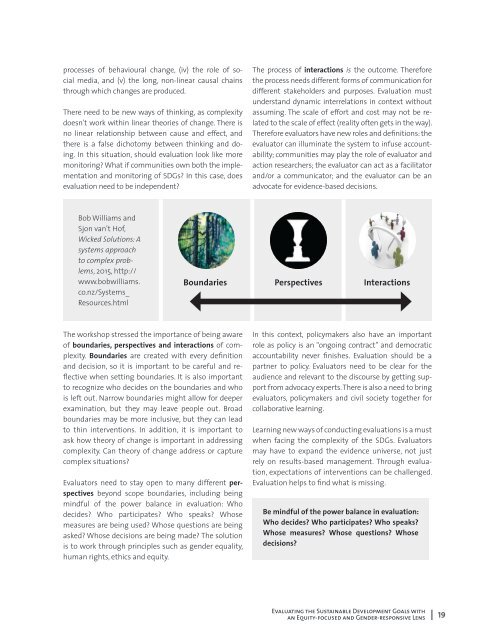NO ONE LEFT BEHIND
NY-Events-Report_WEB
NY-Events-Report_WEB
Create successful ePaper yourself
Turn your PDF publications into a flip-book with our unique Google optimized e-Paper software.
processes of behavioural change, (iv) the role of social<br />
media, and (v) the long, non-linear causal chains<br />
through which changes are produced.<br />
There need to be new ways of thinking, as complexity<br />
doesn’t work within linear theories of change. There is<br />
no linear relationship between cause and effect, and<br />
there is a false dichotomy between thinking and doing.<br />
In this situation, should evaluation look like more<br />
monitoring? What if communities own both the implementation<br />
and monitoring of SDGs? In this case, does<br />
evaluation need to be independent?<br />
The process of interactions is the outcome. Therefore<br />
the process needs different forms of communication for<br />
different stakeholders and purposes. Evaluation must<br />
understand dynamic interrelations in context without<br />
assuming. The scale of effort and cost may not be related<br />
to the scale of effect (reality often gets in the way).<br />
Therefore evaluators have new roles and definitions: the<br />
evaluator can illuminate the system to infuse accountability;<br />
communities may play the role of evaluator and<br />
action researchers; the evaluator can act as a facilitator<br />
and/or a communicator; and the evaluator can be an<br />
advocate for evidence-based decisions.<br />
Bob Williams and<br />
Sjon van’t Hof,<br />
Wicked Solutions: A<br />
systems approach<br />
to complex problems,<br />
2015, http://<br />
www.bobwilliams.<br />
co.nz/Systems_<br />
Resources.html<br />
Boundaries Perspectives Interactions<br />
The workshop stressed the importance of being aware<br />
of boundaries, perspectives and interactions of complexity.<br />
Boundaries are created with every definition<br />
and decision, so it is important to be careful and reflective<br />
when setting boundaries. It is also important<br />
to recognize who decides on the boundaries and who<br />
is left out. Narrow boundaries might allow for deeper<br />
examination, but they may leave people out. Broad<br />
boundaries may be more inclusive, but they can lead<br />
to thin interventions. In addition, it is important to<br />
ask how theory of change is important in addressing<br />
complexity. Can theory of change address or capture<br />
complex situations?<br />
Evaluators need to stay open to many different perspectives<br />
beyond scope boundaries, including being<br />
mindful of the power balance in evaluation: Who<br />
decides? Who participates? Who speaks? Whose<br />
measures are being used? Whose questions are being<br />
asked? Whose decisions are being made? The solution<br />
is to work through principles such as gender equality,<br />
human rights, ethics and equity.<br />
In this context, policymakers also have an important<br />
role as policy is an “ongoing contract” and democratic<br />
accountability never finishes. Evaluation should be a<br />
partner to policy. Evaluators need to be clear for the<br />
audience and relevant to the discourse by getting support<br />
from advocacy experts. There is also a need to bring<br />
evaluators, policymakers and civil society together for<br />
collaborative learning.<br />
Learning new ways of conducting evaluations is a must<br />
when facing the complexity of the SDGs. Evaluators<br />
may have to expand the evidence universe, not just<br />
rely on results-based management. Through evaluation,<br />
expectations of interventions can be challenged.<br />
Evaluation helps to find what is missing.<br />
Be mindful of the power balance in evaluation:<br />
Who decides? Who participates? Who speaks?<br />
Whose measures? Whose questions? Whose<br />
decisions?<br />
Evaluating the Sustainable Development Goals with<br />
an Equity-focused and Gender-responsive Lens 19


